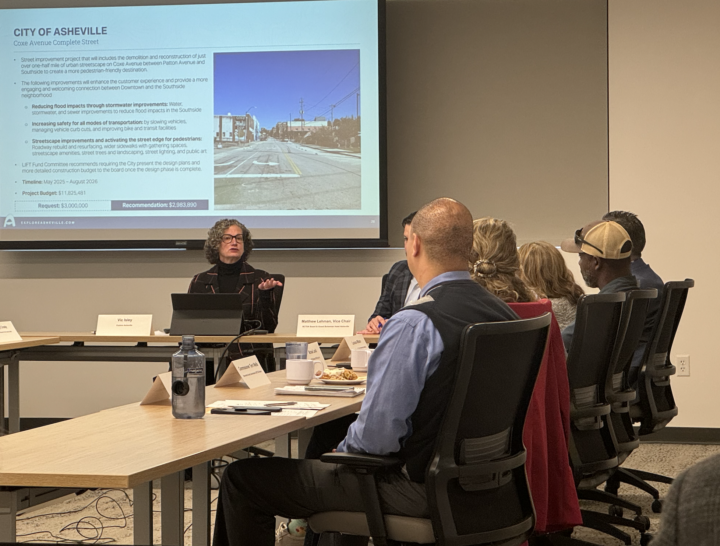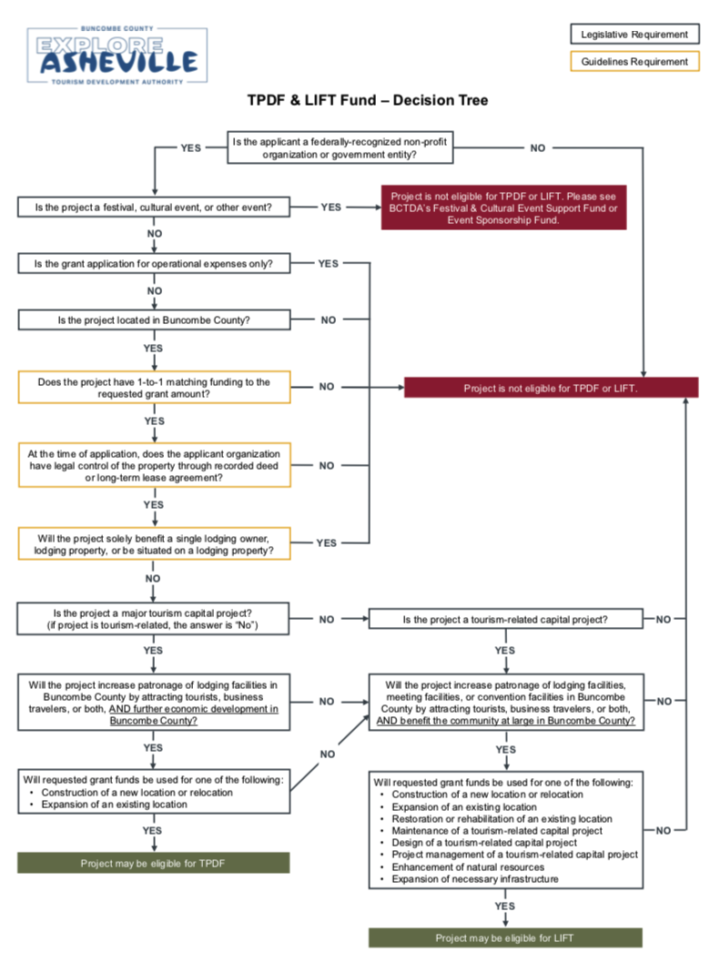In the summer of 2022, unlikely allies U.S. Rep. Chuck Edwards and N.C. Sen. Julie Mayfield, both state senators at the time, were excited about their co-sponsored legislation that would funnel more tourist-generated tax money to community-oriented projects. The same legislation decreased the amount spent on marketing from three-fourths to two-thirds of the occupancy tax budget.
The law created the Legacy Investment from Tourism Fund, tasked with financing projects that would not only help lodging owners but also benefit the community at large in Buncombe County, at the discretion of the Buncombe County Tourism Development Authority. It’s the only fund of its kind in the state, as each local TDA is governed by independent laws and adheres to different guidelines.
Last month, the BCTDA awarded its first slate of 12 grants from the fund, helping finance projects for organizations from the Swannanoa Valley Art League and Black Wall Street AVL to the Asheville Museum of Science and the City of Asheville.
But confusion still permeates between the LIFT Fund and the Tourism Product Development Fund, or TPDF — a debate not helped by vague, overlapping legislation. (The TPDF was created in 2001 to fund “major tourism capital projects” that will “increase patronage of lodging facilities in Buncombe County by attracting tourists, business travelers or both and further economic development” in the county, according to its founding legislation.) Meanwhile, some local housing advocates are frustrated by the TDA’s process and inaugural selections. Elected officials, however, argue it is the current law and not the TDA that is the issue.
Xpress reached out to all parties involved to better understand how the first-year LIFT committee arrived at its decisions.
In the beginning
Similar to the TPDF, the LIFT Fund’s “tourism-related capital projects” should “increase patronage of lodging facilities, meeting facilities or convention facilities” in Buncombe County and “benefit the community at large,” according to state law.
While grant recipients and the TDA celebrated the almost $10 million in inaugural LIFT awards, not everyone was satisfied with the resulting decisions.
“We feel this is a huge missed opportunity for the TDA. They had the chance to stand up and fight for so many in our community that are looking to tourism and the TDA to more prominently and directly advocate for its workers and families,” says Ben Williamson, an organizer with Buncombe Decides, which arose to circulate a petition last year asking the TDA to allocate LIFT Funds to affordable housing projects. The group disbanded after the TDA awarded LIFT grants April 24.

Whether affordable housing projects were among the eligible uses of the fund has been debated since its inception. In his previous role as a TDA board member, Andrew Celwyn advocated for using LIFT Funds for affordable housing. He argued that if workers who prop up the tourism industry can’t afford to live and work in Asheville, there soon might not be anyone to launder the hospitality industry’s sheets.
Mayfield agrees that part of the TDA’s pot of occupancy tax money — about $40 million this year — should “absolutely” go to affordable housing, but the way the current law is written is too vague and could leave the authority vulnerable to litigation if it took that approach, she acknowledges.
The N.C. Restaurant and Lodging Association threatened as much ahead of the April vote.
“If local elected officials decide to use it to fund affordable housing and other nontourism-related expenditures, that interpretation will be done by the courts,” wrote NCLRA President and CEO Lynn Minges in an April 11 letter to Buncombe County commissioners.
Mayfield doesn’t disagree with the NCRLA’s logic, saying that housing advocates shouldn’t blame the TDA and instead should advocate for the legislature to change the guidelines.
Ultimately, the panel funded periphery elements — a greenway and trails — for an affordable housing project, Buncombe County’s Ferry Road development, but denied two other requests that would have directly funded the housing itself. One of those — a $1.5 million request from Mountain Housing Opportunities to help build a 60-unit, low-income housing project on Tunnel Road — made it to the final stage of consideration before being denied.
Assembling the team
Long before the application window opened in July, the TDA sought applications for the nine-member LIFT committee. Per state legislation, a majority of the committee members must be owners or operators of hotels, motels or bed-and-breakfasts. There is no industry restriction on the remaining members, according to the law.
In September, the TDA appointed representatives from an investment services firm, a business consulting firm, a nonprofit and community development consultant, and a restaurant owner, in addition to the lodging appointments.
Williamson and Buncombe Decides had lobbied to get someone on the committee who would represent service industry workers, but their candidate, former Blue Dream Curry House owner James Sutherland, was not chosen.
“We were told James’ candidacy was handicapped as some in the TDA felt he would have a bias toward service workers if placed on the LIFT committee,” Williamson says. “This was interesting to us, as the entire TDA system is set up to have biases toward generating more tourism revenue and overnight stays. It’s rife with bias, by design. If that’s true, that James was left off because he’s pro-worker, this would carry some sort of assumption that you can’t be for tourism and for living wages, affordable housing, access to child care [and] fully funded schools at the same time.”
Candidates for the committee were not specifically interviewed for the unpaid positions, but a three-person nominating committee — which included then-TDA Vice Chair and current Chair Brenda Durden — reviewed applications over two months before making its nominations.

“The BCTDA nominating committee reviewed the pool of 24 applicants and considered their professional and personal life experiences, as well as their depth of knowledge in their fields. The inaugural LIFT Fund Committee represents a diversity of age, expertise and perspectives, allowing them to evaluate applications in an informed and objective manner,” TDA spokesperson Ashley Greenstein sent in an email when asked May 2 about the nominating process and Williamson’s allegation.
“I don’t have a specific agenda,” Sutherland says. “I’ve never been involved in politics, you know. So … I think that they just don’t want to deal with somebody who could be a thorn in their side.”
Williamson said that was the first of several parts of the process that left service workers, who came to several TDA meetings last year to advocate for a greater voice on the LIFT committee, disappointed.
“It makes sense to us that the TDA would enthusiastically welcome the perspective of someone deeply connected to service worker stories, experiences and challenges,” he says. “They chose not to allow one-ninth of the LIFT committee, a TDA subcommittee, to have that voice, and we feel that was a missed opportunity on their part.”
Application phase
The first of two application phases opened Oct. 31, giving applicants about a month to submit initial proposals.
“As a grant proposal writer, I appreciate the two-stage process because it allows some initial vetting of projects before anyone puts in a lot of effort to just see if the project is in the realm of possibility or not,” says George Ivey, N.C. development director at the Blue Ridge Parkway Foundation. The foundation won a $750,000 award for upgrades to the Craggy Gardens Visitor Center.
The committee met Dec. 14 to discuss the phase 1 applications and announced which would be advanced to the second, more rigorous phase on Dec. 18, according to the LIFT committee’s published timeline.
Cassidy Moore, government relations and grants manager for Habitat for Humanity, whose affordable housing project was not moved on to phase 2, says she didn’t know about the Dec. 14 meeting and was informed of the committee’s decision Dec. 19.
Although she said normally she would have a little more interaction with a funder before a decision was made, she called the process “pretty standard.”
“I definitely think they could benefit from being more transparent and clear about what kinds of things they are going to fund. More transparency and clarity would be useful for us all,” Moore says.
While the TDA did not respond to questions about why Habitat’s or any other application was denied, Tiffany Thacker, director of grants, says certain applications “did not meet the statutory limitations for the LIFT Fund, such as the requirement for the project to increase patronage at lodging facilities.”
Minutes of the December meeting did not include details of any discussion, only the 9-0 vote to advance listed projects to phase two.
Seventeen projects were moved on, although only 15 initially followed through with the more involved phase 2 applications. The YMCA’s Project Aspire removed its application before the committee performed a site visit, leaving 14 projects in phase 2.
Lisa Raleigh, executive director of RiverLink, which was awarded $270,000 for its Gateway Park project, says she appreciated the depth she was permitted to include in her phase 2 application.
“I love their application process. They’re very generous in their narrative,” she says, which allows applicants to go into more detail to sell their project than other grant funders do.
Applications were presented in person to the LIFT Committee at Explore Asheville’s offices March 12 and 14, according to minutes. Site visits to each of the remaining projects occurred April 4 and 9. No other action or discussion took place until a phase 2 committee meeting April 18.
“Both the site visit and the in-person presentations are fairly uncommon,” Ivey says.
The process was rather intense, with a higher level of scrutiny than private funders, he added.
Generally, both Ivey and Raleigh were impressed with the committee’s rigor, thoroughness of questioning and overall engagement throughout the process.
Similar funds
Raleigh says the process was very similar to applying for a grant from the TPDF, which has been awarding grants since 2001.
Williamson, who is also executive director of the Asheville Poverty Initiative, says as an outside observer, it is very difficult to tell the difference between the two funds.
“What did we actually get? More of the same. It would be interesting to learn how many of the projects that earned LIFT awards could have been granted TPDF awards, and vice versa,” he says.
One project that seems to prove that overlap is the City of Asheville’s Coxe Avenue complete streets project.
The project received $1.95 million from the TPDF in 2022, although that award was repurposed last year to help beef up the application for renovations at McCormick Field. Under the LIFT Fund, the city received just short of $3 million to complete the redesign of the South Slope’s main drag.

TDA officials didn’t respond to questions about the perceived overlap in project designations but sent a broader description of the differences, citing state legislation, and referred to a “decision tree” created for applicants and posted on the website.
“The change in Buncombe County’s occupancy tax legislation in 2022 broadened the scope of investments the authority can make in tourism-related capital projects. This includes capital maintenance, project administration, design, restoration, maintenance and rehabilitation, as well as the enhancement of natural resources and expansion of necessary infrastructure,” says Thacker. “In this first cycle, we were able to fund design for the city’s Aston Park Tennis Center and Supernova immersive experience and capital maintenance of ExploreAsheville.com Arena, all of which are new uses for this fund.”
Ivey saw at least one difference between the funds.
Since the park’s project provides incremental change to the Craggy Gardens site — adding bathrooms and signage — it is unlikely to have a substantial effect on whether a visitor stays longer in Buncombe County. The site already attracts visitors, and improving it won’t necessarily significantly increase that number the way a brand-new facility would, he acknowledges.
The LIFT Fund doesn’t require as high a burden of proof that a project will encourage visitors to stay longer as TPDF does, Ivey says.
“I would say that the LIFT Fund focuses a lot more on benefiting local residents and not just tourists. That is the case for the parkway. It is loved by locals; it is loved by visitors.”
For Adeline Wolfe, real estate developer for MHO, there’s some confusion about why MHO’s project didn’t meet that more flexible LIFT criteria to “increase patronage of lodging facilities, meeting facilities or convention facilities in Buncombe County by attracting tourists, business travelers or both.”
When drafting the application, she focused on that aspect since she knew she had a strong argument for the “benefiting the community at large” portion of the requirements.
“We made a really strong pitch that affordable housing is an industry in and of itself. And attracting that level of construction and national-level financial partners here leads to a huge boom in economic activity that the tourism sector directly benefits from,” she says.
She says she knew getting approved for LIFT funding was going to require bold action from the TDA, but she feels she had a strong application that fit the legislative requirements.
TDA officials did not respond directly to questions about why MHO didn’t qualify for funding.
Next steps
Mayfield says she considered introducing legislation during this year’s short session to more clearly allow TDA funds to be used to benefit hospitality workers but decided against it after discussions with authority officials.
New legislation isn’t likely to pass without buy-in from all key players, including the TDA board, she says. But she is optimistic more tweaks can be made in future years.
While Williamson and others have floated the idea of abolishing the current TDA in an effort to take more control over how the occupancy tax dollars are spent, Mayfield says that is not realistic, but she does believe that more money should go toward public projects, including supporting hospitality workers and affordable housing.
“What really needs to happen is the legislative guidelines need to change,” she says.




Before you comment
The comments section is here to provide a platform for civil dialogue on the issues we face together as a local community. Xpress is committed to offering this platform for all voices, but when the tone of the discussion gets nasty or strays off topic, we believe many people choose not to participate. Xpress editors are determined to moderate comments to ensure a constructive interchange is maintained. All comments judged not to be in keeping with the spirit of civil discourse will be removed and repeat violators will be banned. See here for our terms of service. Thank you for being part of this effort to promote respectful discussion.